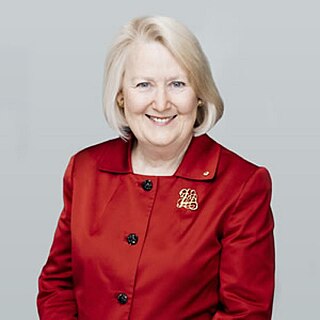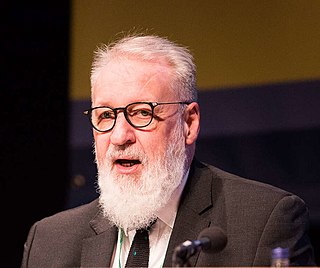Disbarment, also known as striking off, is the removal of a lawyer from a bar association or the practice of law, thus revoking their law license or admission to practice law. Disbarment is usually a punishment for unethical or criminal conduct but may also be imposed for incompetence or incapacity. Procedures vary depending on the law society; temporary disbarment may be referred to as suspension.

The Judiciary of the Hong Kong Special Administrative Region is the judicial branch of the Hong Kong Special Administrative Region. Under the Basic Law of Hong Kong, it exercises the judicial power of the Region and is independent of the executive and legislative branches of the Government. The courts in Hong Kong hear and adjudicate all prosecutions and civil disputes, including all public and private law matters.

The courts of Scotland are responsible for administration of justice in Scotland, under statutory, common law and equitable provisions within Scots law. The courts are presided over by the judiciary of Scotland, who are the various judicial office holders responsible for issuing judgments, ensuring fair trials, and deciding on sentencing. The Court of Session is the supreme civil court of Scotland, subject to appeals to the Supreme Court of the United Kingdom, and the High Court of Justiciary is the supreme criminal court, which is only subject to the authority of the Supreme Court of the United Kingdom on devolution issues and human rights compatibility issues.

The Supreme Court of Singapore is a set of courts in Singapore, comprising the Court of Appeal and the High Court. It hears both civil and criminal matters. The Court of Appeal hears both civil and criminal appeals from the High Court. The Court of Appeal may also decide a point of law reserved for its decision by the High Court, as well as any point of law of public interest arising in the course of an appeal from a court subordinate to the High Court, which has been reserved by the High Court for decision of the Court of Appeal.
The Solicitors Regulation Authority (SRA) is the regulatory body for solicitors in England and Wales.
Lawrence Ang Boon Kong is a Singaporean lawyer who specialises in corporate offences and criminal law.
The Nurses and Midwives Tribunal is a former tribunal that was established in the Australian state of New South Wales which dealt with appeals and complaints of professional misconduct by nurses and midwives. The tribunal generally heard matters after the Nurses and Midwives Board has made a decision or a professional association had referred an issue to the tribunal. The tribunal heard matters in an informal manner in an attempt to do justice in the matter. The tribunal also conducted inquiries into complaints referred by the New South Wales Health Care Complaints Commission.
"Appeal as from an abuse" is a legal term applied in the canon law of the Catholic Church, meaning originally a legal appeal as recourse to the civil forum (court) against the usurpation by the ecclesiastical forum of the rights of civil jurisdiction. It could also mean a recourse to the ecclesiastical forum against the usurpation by the civil forum of the rights of ecclesiastical jurisdiction.
The Physiotherapists Tribunal is a former tribunal established in the Australian state of New South Wales which dealt with appeals and complaints of professional misconduct by physiotherapists.

The Courts and Legal Services Act 1990 was an Act of the Parliament of the United Kingdom that reformed the legal profession and courts of England and Wales. The Act was the culmination of a series of reports and reforms that started with the Benson Commission in the 1970s, and significantly changed the way that the legal profession and court system worked.
The Glanville Davies affair was a scandal in the English legal profession which resulted in greater reform of the regulatory processes for solicitors and was one of the justifications for the Courts and Legal Services Act 1990. Glanville Davies was a well-respected solicitor and a member of the Council of the Law Society of England and Wales who massively overcharged his client, Leslie Persons, sending him a bill for £197,000 that was reduced on taxation to £67,000. Davies was not punished by the Law Society's internal regulatory committees, which allowed him to resign from the council on the grounds of ill-health with his reputation intact. Following litigation and public criticism, the Law Society commissioned an internal report that found "administrative failures, wrong decisions, mistakes, errors of judgement, failures in communication and insensitivity". A private member's bill reformed the way in which the Law Society investigated disciplinary complaints, although not to the extent initially proposed, and paved the way for the Courts and Legal Services Act 1990 that created an independent disciplinary body.

Roslyn Gay Atkinson is a former Justice of the Supreme Court of Queensland, who served for 20 years from 1998 until her retirement in 2018. In 2002 she also became the Chairperson of the Queensland Law Reform Commission, and served in that role until her retirement in 2013. As well as being responsible for the Yankee Doodles precedent, Justice Atkinson has also made two notable decisions in her capacity as member of the Queensland Legal Practice Tribunal.

The Investigatory Powers Tribunal (IPT) is a first-instance tribunal and superior court of record in the United Kingdom. It is primarily an inquisitorial court.

The judiciary of Scotland are the judicial office holders who sit in the courts of Scotland and make decisions in both civil and criminal cases. Judges make sure that cases and verdicts are within the parameters set by Scots law, and they must hand down appropriate judgments and sentences. Judicial independence is guaranteed in law, with a legal duty on Scottish Ministers, the Lord Advocate and the Members of the Scottish Parliament to uphold judicial independence, and barring them from influencing the judges through any form of special access.

Tasmina Ahmed-Sheikh OBE WS NP is a Scottish politician, serving as chair of the Alba Party since 2021. She was also the Member of Parliament (MP) for Ochil and South Perthshire from 2015 to 2017. A former member of the Scottish Conservatives, Labour, and the Scottish National Party (SNP), Ahmed-Sheikh served as the SNP's Trade and Investment spokesperson, Deputy Shadow Leader of the House in the House of Commons, and the SNP's National Women's and Equalities Convener. A solicitor and businessperson, and a former actress, Ahmed-Sheikh founded and formerly chaired the Scottish Asian Women's Association.
The Scottish Legal Complaints Commission (SLCC) is a non-departmental public body responsible dealing with unresolved complaints against legal practitioners operating in Scotland. It was established under the Legal Profession and Legal Aid (Scotland) Act 2007 and came into operation on 1 October 2008, replacing the Scottish Legal Services Ombudsman.
The New York State Commission on Judicial Conduct is an eleven-member panel with authority to discipline judges of the New York courts. The Commission is constitutionally established to investigate and prosecute complaints filed against New York judges.
The Medical Practitioners Tribunal Service (MPTS) is a tribunal in the United Kingdom that adjudicates on complaints made against doctors, making independent decisions about their fitness to practise. This includes imposing sanctions for decisions about violations of ethical principles.

Alistair John MacKenzie Duff is a former Scottish advocate and sheriff who later became Director of the Judicial Institute of Scotland before resigning after being arrested and charged with undisclosed offences.

In the United Kingdom, Police Appeals Tribunals hear appeals from police officer misconduct hearings. Officially the Police Appeals (Disciplinary) Tribunal, it is a 'virtual' non-departmental public body managed by the Home Office.










